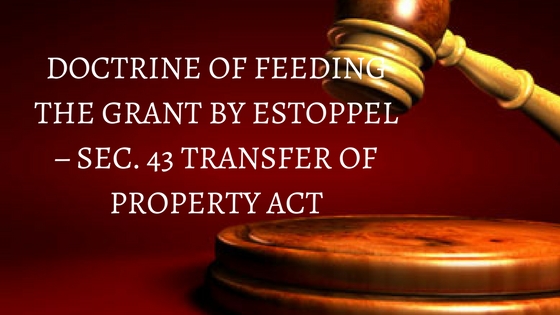Aapka Consultant Judgment Series- In this series, we are providing case analysis of Landmark Judgments of Hon’ble Supreme Court of India.
The Jumma Masjid, Mercara vs. Kodimaniandra Deviah
AIR1962SC847; [1962]Supp2SCR554
Hon’ble Judges/Coram: J.C. Shah, J.L. Kapur, M. Hidayatullah and T.L. Venkatarama Aiyyar, JJ.
Decided On: 11.01.1962
FACTS:-
Mallappa and Santhappa claiming to be reversioners to the estate of Nanjundappa sold the property in dispute to Ganapathi predecessor-in-interest of the respondents. The sale deed recited that the property belonged to the joint family of two brothers Nanjundappa and Basappa, and on the death of Nanjundappa it was inherited by his widow and on her death it had devolved upon them as reversioners to the state. Ganapathi sued to recover possession of the properties. The suit was contested by the widow of Basappa (brother of Nanjundappa) claiming that the property was the self acquired property of her husband. During the pendency of the litigation the widow died, and Ganapathi applied to the revenue authorities to transfer the ‘pattas’ in his name. The appellants intervened alleging that the property was gifted to them by the widow, and Santhappa one of the reversioners had also executed a release of the said property for a consideration. This objection was rejected. The appellants then sued for possession of a half share in the properties held by the widow of Basappa, relying upon the gift by the widow, and the deed of surrender by Santhappa one of the two reversioners to the estate of Nanjundappa. The Appellants contended that the Vendors of the property to Ganapathi had only a spes successionis during the life time of the widow of Basappa, and the transfer was on that account void and conferred no title. The respondents to the suit contended that the property was sold to Ganapathi by Santhappa on a representation that he had become entitled thereto, and the appellants as transferees from Santhappa were estopped from asserting that it was in fact the self-acquisition of property and that in consequence he had no title at the date of the sale.
ISSUE:-
Whether a transfer of property for consideration made by a person who represents that he has a present and transferable interest therein, while he possesses, in fact, only a spes successionis, is within the protection of Section 43 of the Transfer of Property Act (herein after referred as ‘the Act’)?
JUDGMENT:-
Considering the scope of the Section 43 on its terms, it clearly applies whenever a person transfers property to which he has no title on a representation that he has a present and transferable interest therein, and acting on that representation, the transferee takes a transfer for consideration. When these conditions are satisfied, the section enacts that if the transferor subsequently acquires the property, the transferee becomes entitled to it, if the transfer has not meantime been thrown up or cancelled and is subsisting. There is an exception in favour of transferees for consideration in good faith and without notice of the rights under the prior transfer. But apart from that, the section is absolute and unqualified in its operation. It applies to all transfers which fulfil the conditions prescribed therein, and it makes no difference in its application, whether the defect of title in the transferor arises by reason of his having no interest whatsoever in the property, or of his interest therein being that of an expectant heir.
That section embodies, as already stated, a rule of estoppel and enacts that a person who makes a representation shall not be heard to allege the contrary as against a person who acts on that representation. It is immaterial whether the transferor acts bona fide or fraudulently in making the representation. It is only material to find out whether in fact the transferee has been misled. It is to be noted that when the decision by the Courts below was given, the relevant words of Section 43 were, “where a person erroneously represents”, and now, as amended by Act 20 of 1929, they are “where a person fraudulently or erroneously represents”, and that emphasises that for the purpose of the section it matters not whether the transferor act fraudulently or innocently in making the representation, and that what is material is that he did made representation and the transferee has acted on it. Where the transferee knew as a fact that the transferor did not possess the title which he represents he has, then he cannot be said to have acted on it when taking a transfer. Section 43 would then have no application, and the transfer will fail under Section 6(a) of the Act. But where the transferee does act on the representation, there is no reason why he should not have the benefit of the equitable doctrine embodied in Section 43, however fraudulent the act of the transferor might have been.
HELD:-
The Court held that when a person transfers property representing that he has a present interest therein, whereas he has, in fact, only a spes successionis, the transferee is entitled to the benefit of Section 43, if he has taken the transfer on the faith of that representation and for consideration. In the present case, Santhappa, the vendor represented that he was entitled to the property in praesenti, and it has been found that the purchaser entered into the transaction acting on that representation. He therefore acquired title to the properties under Section 44 of the Act, when Santhappa became in titular on the death of Gangamma on February 17, 1933, and the subsequent dealing with them by Santhappa by way of release did not operate to vest any title in the appellant.
To Get Legal Opinion from Advocates/ Legal Experts, Please click here
To Get Legal Opinion from Retired Hon’ble Judges, Please click here












